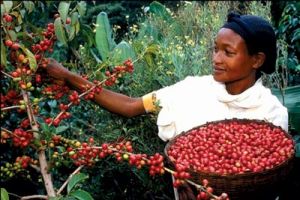The Coffee War in Kenya
According to a survey released by local media, six western companies currently control about 60% to 70% of the coffee trade in the Kenyan market.
Last year, for example, the "Big six" received about 5.2 billion shillings ($60.5 million) to 5.6 billion shillings ($65.12 million) from the industry. the other 44 traders can only share the remaining less than 3 billion shillings ($34.88 million).
At the top of the list of the "Big six" is the British company TAYLO WINCH, which accounts for 15 per cent of the raw coffee purchasing market, followed by the diamond coffee company with a market share of 12.06 per cent, and the third UK company ARMAJARO with a market share of 10.78 per cent. In addition, there are enterprises from Germany, France and other countries participating in it.
TAYLO WINCH, for example, ships most of its coffee to Sweden, where it is baked, mixed and processed by the local VOLCAFE Coffee Company before being shipped to the United States. In the United States, the coffee is either sold directly or re-sold to other countries. It can be said that TAYLO WINCH and its partners control all aspects from production to sales.
The monopoly position determines that the "Big six" can control the rise and fall of market prices, and their participation in value chains ranging from collecting coffee beans, grinding and trading to roasting, warehousing and logistics makes it difficult for other buyers to enter the local coffee market.
Kenyan coffee farmers are at the bottom of the industry value chain. The price of unprocessed coffee beans was only about 130 shillings ($1.51) per kilogram at its peak, and the middleman who bought the coffee sold it on the exchange for more than twice as much. The market price of processed coffee will rise to 4000 shillings ($46.50).
To break this situation, Kenyan authorities are trying to attract buyers from countries such as China, South Korea, Japan and the United Arab Emirates to participate in the local coffee market in order to achieve a more balanced coffee trade, benefit farmers and increase local taxes.
According to local media reports, major coffee producing areas such as Nieli and Migoli have negotiated agreements with buyers from China. According to the agreement, local coffee farmers will sell coffee directly to Chinese merchants at a price of about 250 shillings ($2.90) per kilogram.
Some people with vested interests have protested against this practice. Two weeks ago, some Western companies warned coffee makers through the media that they would face billions of shillings in losses if they allowed the government's new agreement to be implemented.
"it is clear that government officials lack an understanding of coffee production and trading structure, and the policies introduced by these governments will not only harm the interests of coffee-related practitioners in the country," the company said in a statement. it will also cause chaos in coffee purchases around the world. "
In response, Gachagua, a local official in Nieli County, said that although many vested interests have called on local lawmakers and heads of coffee cooperation agencies to unite against this policy, which can bring real wealth to farmers, he will not give in.
"I know that a lot of money will be used to destroy our efforts to liberate the farmers, and I even realize that some people want to remove the current government in the next election, but this will not stop our efforts," Gachagua said. The bow did not turn back, and we bear the trust of the people. "
Coffee is one of the main sources of foreign exchange in Kenya, and its foreign exchange earning status is second only to tea, horticulture and tourism.
Last year, as global supply increased and international coffee prices continued to fall, Kenyan coffee prices fell to their lowest level since 2007, seriously affecting the livelihoods of millions of coffee farmers. Coffee prices have rebounded since the beginning of this year due to an expected decline in coffee production due to dry weather in Brazil.

Important Notice :
前街咖啡 FrontStreet Coffee has moved to new addredd:
FrontStreet Coffee Address: 315,Donghua East Road,GuangZhou
Tel:020 38364473
- Prev

The United States: there are no taboos about the unique coffee drinking habits of American style.
When Americans drink coffee, it is like playing a game without rules, laissez-faire without taboos. Americans are dismissive of all kinds of exquisite coffee made by Europeans. Americans drink coffee freely, and at the same time, coffee goes deep into their lives and is difficult to separate, and the influence is so deep that it is not considered a life without coffee. It is said that Apollo carried a man to the moon for the first time.
- Next

The King's Coffee-Puerto Rico Yaoke Coffee
Puerto Rico, originally an Indian settlement, was discovered during Columbus's second trip to the American continent. The Republic of Puerto Rico was established after the people's armed uprising in 1950, but it has always been a federation of the United States, and its residents have the status of United States citizens.
Related
- How did the Salvadoran coffee industry develop in Central America?
- What exactly does the golden cup extraction of coffee mean?
- The Origin of Coffee flower
- [2023 Starbucks World Earth Day] there are more meaningful things besides free Starbucks coffee!
- What kind of coffee is there in Spain? 9 Flavors of Spanish Coffee
- Aromatic African coffee| Kenya's coffee culture and historical production area
- Liberica Coffee Bean knowledge: the characteristics of Liberian Coffee beans of the three original species of Coffee beans
- The origin and formula of Spanish latte introduces the taste characteristics of Bombon coffee in Valencia, Spain.
- How to adjust the solution of over-extracted coffee
- What is the tasting period of coffee beans? What is the period of coffee and beans? How should coffee wake up and raise beans?

